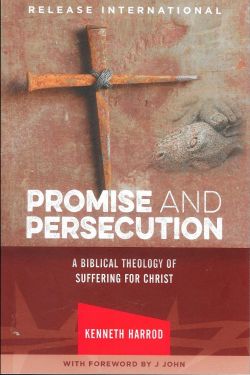Promise and Persecution: How should we respond when Christians come under attack?
In China a pastor is imprisoned and his church building bulldozed by local authorities. In Nigeria a Christian community is attacked and people slaughtered by Islamists. In India evangelists are beaten by Hindu nationalists and falsely accused of forcing people to convert. The persecution of Christians around the world is a phenomenon we are growing used to hearing about on a regular basis.
Back in the 1960s Romanian pastor Richard Wurmbrand shocked many when he spoke candidly about the suffering of Christians behind the old Iron Curtain. Few knew what had been happening. In the information-soaked world of today news travels more quickly – and more prolifically.

How do we respond? How should we respond?
Promise and Persecution, a book published by Release International, goes behind the current headlines to help us understand persecution, in the context of God's bigger plan of salvation.
Our understanding of why Christians are persecuted will inevitably shape the response that we make. For example, if we view the persecution of Christians – in the various cultural forms that it takes around the world – as primarily a human rights issue we will respond accordingly: advocating for religious freedom will become our priority.
However, it is at this point that as Christians we ought to ask: What does the Bible teach us? What does Scripture say? Are there any spiritual principles at work in persecution that we need to grasp and engage with?
At the Last Supper Jesus made this stark declaration to his disciples: 'If the world hates you, know that it has hated me before it hated you. If you were of the world, the world would love you as its own; but because you are not of the world, but I chose you out of the world, therefore the world hates you... But all these things they will do to you on account of my name, because they do not know him who sent me' (John 15:18-21; ESV).
This suggests that far from being merely a human rights issue, the persecution of Christians – for being Christians – is bound up with Jesus and the gospel. In other words, there are underlying spiritual reasons behind the persecution of Christians. Jesus goes on to add that he has raised this unpleasant subject so that his followers will be prepared: and so that when it happens they will not fall away (see 16:1). The experience – indeed, the inevitability – of persecution challenges Christian discipleship. That makes it relevant to us all if we profess to be followers of Jesus Christ.
But we can trace the principles Jesus alludes to back to a much earlier point in the Bible's story – back, in fact, to the beginning.
Following the events of what we refer to as the Fall, God speaks words of judgment to the serpent, declaring, 'I will put enmity between you and the woman, and between your offspring [or 'seed'] and her offspring; he shall bruise your head, and you shall bruise his heel' (Genesis 3:15).
This verse has long been recognised as offering the first gospel hint in the Bible – a small chink of hope in the darkness of judgment, a suggestion that God's 'in the day that you eat of it you shall surely die' (Genesis 2:17) will not herald the end of the story.
But the promised victory of this offspring of the woman will come in and through suffering. Moreover, God's word to the serpent would suggest a basic division – two lines, we might say, of offspring – and there will be conflict, or what God refers to as 'enmity'.
It is here that we find the spiritual soil from which everything that motivates the persecution of God's people grows.
The Bible's storyline is, in many ways, the story of how that first enigmatic promise of Genesis finds its way to Jesus – and then looks beyond Jesus' first coming to his glorious return and to the establishment of the New Heavens and New Earth.

Tracing that story also becomes an exercise in recognising the on-going hostility to God and his people, how that hostility manifests itself, and lessons and principles we learn in order to respond as God would have us respond.
That is the subject of Release International's Promise and Persecution. Release is a ministry committed to a biblical understanding of, and response to, the reality of persecution. This is a response that encourages Christians in the West not just to pray for, and to stand alongside persecuted Christians – but to learn lessons of true Christian discipleship with them.
In a powerful foreword to the book the evangelist J John writes: 'Persecution is something we need to think about, talk about and pray about. Above all we need to have a firm biblical background, and that is exactly where this book, scholarly and readable, rooted in theology and utterly relevant, is of enormous help. We need to see ourselves in the right perspective; not just in terms of the world's big picture but in terms of God's big picture.
'Promise and Persecution' can be ordered online from Release International. Kenneth Harrod works for Release International.











